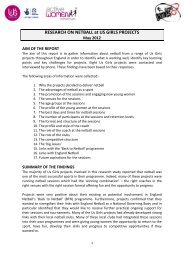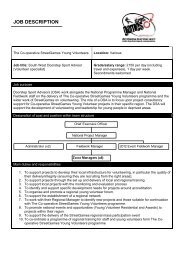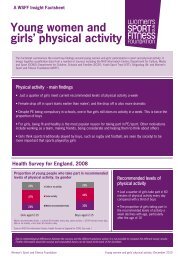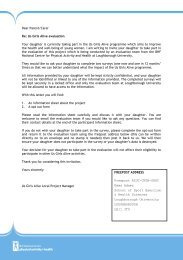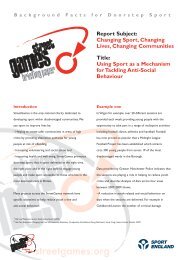Framework for Building a Participation Legacy - StreetGames
Framework for Building a Participation Legacy - StreetGames
Framework for Building a Participation Legacy - StreetGames
You also want an ePaper? Increase the reach of your titles
YUMPU automatically turns print PDFs into web optimized ePapers that Google loves.
<strong>Framework</strong> <strong>for</strong> <strong>Building</strong> a <strong>Participation</strong> <strong>Legacy</strong><br />
9<br />
Approaches to Evaluation<br />
Evaluation can occur be<strong>for</strong>e, during and after your programme begins. This means that<br />
evaluation should be part of the planning of your programme in order to allow time <strong>for</strong> pre-test<br />
or baseline measures. In addition, planning your evaluation early helps to ensure that the design<br />
of the evaluation fits the aims and objectives of your programme.<br />
Impact Evaluation<br />
•Typically employs a pre/post design<br />
•Most commonly used to demonstrate the effectiveness of an intervention<br />
designed to change behaviours, attitudes, knowledge, or skill<br />
Process or Formative Evaluation<br />
•Provides insight into 'what is happening?'<br />
•Helps to explain and contextualise outcome and impact findings<br />
•Provides opportunities to modify programmes<br />
Outcome Evaluation<br />
•Focuses on understanding the effects of the programme<br />
•Useful when establishing a baseline or conducting a pre-test is not feasible or<br />
desirable<br />
Impact evaluation investigates specific changes that result from a programme or intervention.<br />
In an impact evaluation participants are assessed prior to and at the end of the programme.<br />
Impact evaluations are challenging as it is often difficult to ascertain causal relationships, i.e. be<br />
certain that any changes are due to the programme; however, they can be important <strong>for</strong><br />
demonstrating the value of a programme.<br />
Process evaluation is useful <strong>for</strong> understanding<br />
whether a programme is working, what elements<br />
are working well, and what might need to be<br />
changed.<br />
Outcome evaluation occurs at the end of the<br />
programme and explores how well the programme<br />
met its aims and objectives. It often focuses on<br />
participants’ reports of what happened as well as<br />
more quantitative measures of success related to<br />
attendance or fitness levels.<br />
‘Outcome evaluation alone is not<br />
sufficient as it does not explore the<br />
reasons why an intervention has been<br />
successful. We must ask what, how<br />
and why a sport/physical activity<br />
intervention is successful if the<br />
evaluation is to be meaningful’.<br />
(Dugdill & Stratton, 2007: 5)<br />
March 2013





